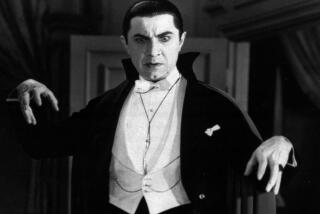âGhosts of Mississippi,â by Way of Hollywood
âGhosts of Mississippiâ starts by insisting âThis story is true,â words that tend to be a prelude to a frustrating film experience. Not because movies are prone to the inevitable condensing and rearranging of minor matters of fact--thatâs a given and of little importance. What happens in movies like âGhostsâ is more subtle, and, though understandable, less easy to forgive.
The story of the 1963 murder of Mississippi civil rights activist Medgar Evers and the attempt to bring his murderer to justice a quarter century later is tragic and heroic enough to deserve a wider audience, and both producer-director Rob Reiner and writer Lewis Colick must be counted as sincere in their attempt to bring it to the screen.
But the makers of âGhosts of Mississippiâ are also children of Hollywood, and Hollywood is not set up to tell the truth. Or anything close to it. The system turns complex people into paragons or fiends, converts subtle situations into emotional slam dunks, softens the edges of a story to make it easier to handle, all to quell its own institutional fear that anything with the messy taint of reality will alienate part of the audience. All of which, to varying degrees, has happened here.
So even if its facts skew toward accurate, the nuances in âGhosts of Mississippiâ are all wrong. Unable to resist making things feel pat and obvious, the filmmakers have taken the drama out of what should be a riveting scenario, leaving nothing for an audience to become involved with. And itâs made its characters so predictable we half expect to see halos over the heroes and the villain twirling a waxed mustache.
Itâs a further measure of how Hollywoodized this story has become that âGhosts of Mississippiâ plays like âA Time to Killâ on Prozac. The two films share many plot elements--implacable racists, courtroom confrontations, bomb threats to the heroâs home, a blond wife who lacks her husbandâs high ideals--but âGhostsâ has smothered the potential emotion in reverence and self-righteousness.
And though early publicity indicated that the first third of the film would deal with Medgar Eversâ life and death, as it now stands âGhosts of Mississippiâ relegates that story to a brief prelude. Instead weâre presented with another movie in the âMississippi Burningâ tradition that focuses on a heroic white person getting his eyes opened about the nature of his own and societyâs racism.
Bobby DeLaughter (Alec Baldwin), assistant district attorney in Jackson, Miss., is the kind of guy who doesnât think twice about using âDixieâ as a lullaby to quiet his daughter. But then his boss, Dist. Atty. Ed Peters (Craig T. Nelson), assigns him to look into the possibility of reopening the stateâs case against Byron De La Beckwith (James Woods).
An unapologetic racist and white supremacist and a man so nasty âeven the Klan is afraid of him,â Beckwith was tried twice for Eversâ murder. And since âGhostsâ opens with a sequence of him pulling the trigger, we know he did it. But two all-white male Mississippi juries couldnât reach a verdict on his guilt or innocence, and the mistrials left him a free man.
*
But in 1989 evidence of possible jury tampering leads Eversâ widow, Myrlie (Whoopi Goldberg), to press for a new trial. And though his staff teases him with Lindbergh baby jokes and his wife fumes about her position in local society, DeLaughter gets increasingly obsessed with the concept of bringing Beckwith to justice.
This does not prove to be easy. Almost every piece of physical evidence has disappeared, there isnât even a copy of the original trial transcripts, and Beckwithâs alibi witnesses stand by their stories.
But with the help of investigator Charlie Crisco (William H. Macy), DeLaughter turns up a thing or two and presses onward, despite the initially lukewarm support of Myrlie Evers, who isnât sure how much she can trust this son of the South who even has a wife named Dixie.
Normally a warm and funny actress, Goldberg gives the kind of preserved-in-amber performance as Eversâ widow you would expect from an authorized film biography of Mother Teresa. Its embalmed, worshipful quality does credit neither to her nor to Myrlie Evers, who in real life went on to become chairwoman of the board of the NAACP.
Doing the liveliest job is Woods, who appears initially as the young murderous Beckwith and then, with the aid of hours of makeup, as the 73-year-old accused. Itâs a showy performance, all sneering and cocky twitchiness, and it offers the only hint of life in a somnolent piece of business that takes itself more seriously than whatâs on the screen deserves.
* MPAA rating: PG-13 for a strong scene of violence and for racial dialogue. Times guidelines: Eversâ murder is graphically shown.
(BEGIN TEXT OF INFOBOX / INFOGRAPHIC)
âGhosts of Mississippiâ
Alec Baldwin: Bobby DeLaughter
Whoopi Goldberg: Myrlie Evers
James Woods: Byron De La Beckwith
Craig T. Nelson: Ed Peters
Susanna Thompson: Peggy Lloyd
Castle Rock Entertainment presents a Fred Zollo production, released by Columbia Pictures. Director Rob Reiner. Producers Rob Reiner, Frederick Zollo, Nicholas Paleologos, Andrew Scheinman. Executive producers Jeffrey Stott, Charles Newirth. Screenplay Lewis Colick. Cinematographer John Seale. Editor Robert Leighton. Costumes Gloria Gresham. Music Marc Shaiman. Production design Lily Kilvert. Art director Christopher Burian-Mohr. Set decorator Karen A. OâHara. Running time: 2 hours, 3 minutes.
* At selected theaters throughout Southern California.
More to Read
Only good movies
Get the Indie Focus newsletter, Mark Olsen's weekly guide to the world of cinema.
You may occasionally receive promotional content from the Los Angeles Times.











